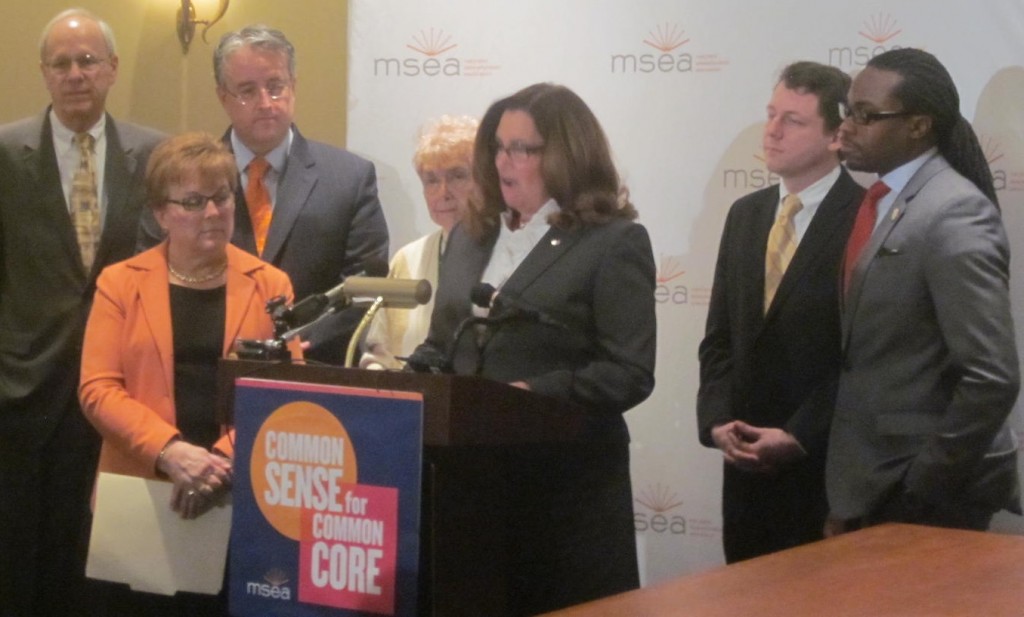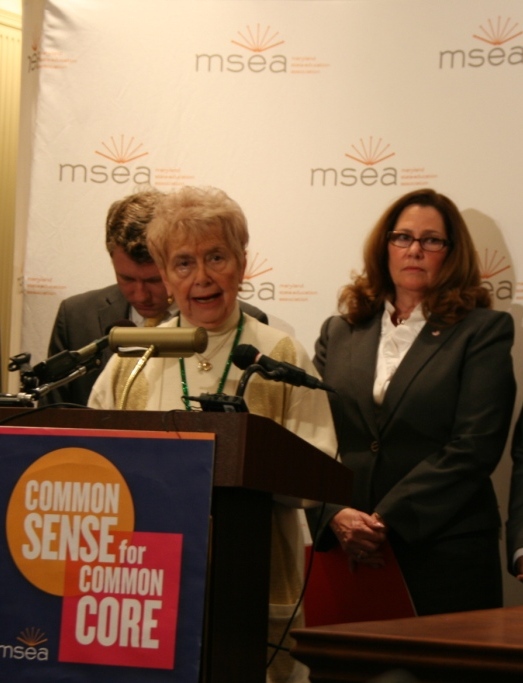O’Malley opposes attempt to stop MSA testing next month
By Glynis Kazanjian

News conference with , and from left, Sens. Paul Pinsky, Nancy King, Richard Madaleno, Del. Sheila Hixson, MSEA President Betty Weller at podium, Dels. Eric Luedtke and Alonzo Washington.
Gov. Martin O’Malley’s office said Tuesday he stands by a state education department decision to move forward with administering the final Maryland School Assessment (MSA) test in a few weeks, despite efforts by legislators, teachers, unions and school boards to stop it.
Hearings were held Tuesday in a Senate committee and last week in the House on emergency bills that would require the Maryland State Department of Education (MSDE) to ask federal education officials to waive the testing requirement, because the testing material is based on an outdated curriculum.
The governor does not support dropping the test, his spokeswoman said.
“We stand firm [that] the MSAs are still worthwhile,” said press secretary Nina Smith. “The tests provide important information about where student performance is, and we will know which questions are aligned with Maryland’s college ready standards and which are not. This will help inform how we use the data eventually. We are moving forward.”
The MSA test will be phased out after this school year, and a new student assessment test aligned with Maryland’s new Common Core education curriculum will be phased in. But MSDE is requiring school districts to administer the MSA one last time in a few weeks, saying dropping the test might cost the state as much as $280 million in federal funds.
 Democratic lawmakers and the Maryland Student Education Association, which represents over 70,000 educators in Maryland, made a push Tuesday in Annapolis for a package of bills related to Common Core, including the emergency legislation to halt the MSA tests from being administered in March.
Democratic lawmakers and the Maryland Student Education Association, which represents over 70,000 educators in Maryland, made a push Tuesday in Annapolis for a package of bills related to Common Core, including the emergency legislation to halt the MSA tests from being administered in March.
Teachers union wants to slow implementation of Common Core
MSEA had been optimistic that the emergency legislation would easily pass both legislative chambers, leaving only the governor’s signature to enact the bill. But while the teachers union opposes the final test, it is much more concerned with slowing down and improving the implementation of the Common Core curriculum.
“We’ve been encouraged by the support and conversations around this issue, and whether or not we administer the MSA this year we hope that Governor O’Malley, MSDE, and legislative leaders will stand with educators, parents, and students for common sense fixes to the implementation problems that have plagued Common Core thus far,” said Adam Mendelson, communications director for the teacher’s organization.
The state has already spent approximately $15 million out of $22.6 million in contracts preparing for the MSA tests, according to a report by the Department of Legislative Services, the legislature’s research arm.
Federal fines threatened
The U.S. Department of Education has threatened to fine Maryland if it cancels the MSA test, because that would put the schools out of compliance with the federal Elementary and Secondary Education Act, which requires students to be tested annually in reading, mathematics and science.
The emergency bills, sponsored by Montgomery County Sen. Nancy King and Del. Eric Luedtke, would require the state education department to file for a waiver from the test. If a waiver is not granted, the bill would call for the cancellation of the test unless the penalties for cancelling the test worked out to be higher than administering the test.
Even if the governor supported the effort to seek a waiver, the potential financial penalties and the amount of time needed to obtain the waiver before the scheduled March 3 tests, would make the task an uphill battle.
Jack Smith, MSDE’s chief academic officer, told the Senate Education, Health and Environmental Affairs Committee Tuesday that the potential loss of federal aid is real, as shown in a Washington Post article posted a few hours before about California’s show down with the feds over testing.
Education committee chairman Joan Carter Conway said, “I understand where the teachers are coming from.” But a key question for her is: “Do we lose money or do we not lose money?”
Slowing down Common Core

Ways & Means Chair Sheila Hixson at podium, with Del. Eric Luedtke and MSEA President Betty Weller. “My priority is getting education reforms done right, instead of rushing to implement new standards and curriculums and evaluations at one time,” said Hixson.
An array of other bills showcased at the Tuesday news conference related to slowing down the implementation of Common Core.
Protecting the autonomy of local school board decisions and creating a Common Core implementation workgroup were top priorities for Democratic lawmakers who attended.
Creating a mechanism for the legislature to review federal waiver requests made by the state education department was also high on the list.
Common Core was developed in partnership with the National Governor’s Association and the Council of Chief State School Officers.
Maryland adopted the Common Core curriculum in 2010 and received federal Race to the Top grants to implement an education philosophy that emphasizes college and career readiness by high school graduation.
“A top-down, one-size-fits-all curriculum”
Many of the complaints that surfaced Tuesday, criticized Common Core for being “a top-down, one-size-fits-all curriculum.”
Citing a rushed implementation process and loss of control over education decisions, lawmakers and teachers urged slower implementation of Common Core.
“My priority is getting education reforms done right, instead of rushing to implement new standards and curriculums and evaluations at one time,” said House Ways and Means Committee Chairwoman Sheila Hixson, who is co-sponsoring a number of the bills.
MSEA President Betty Weller called the implementation of Common Core a “train wreck.”
“Right now our schools are faced with a tsunami of education reform,” Weller said.”The implementation of these changes has been a train wreck in far too many districts, for far too many students and for far too many educators. We are at risk.”
Len Lazarick contributed to this story.
Related stories:
Teachers, school boards seek to drop standardized tests this year
Lawmakers target controversial new common core curriculum and testing
Common core generates bill to drop old tests in Md. public schools
Repealing Common Core appeals to scores of parents

MarylandReporter.com is a daily news website produced by journalists committed to making state government as open, transparent, accountable and responsive as possible – in deed, not just in promise. We believe the people who pay for this government are entitled to have their money spent in an efficient and effective way, and that they are entitled to keep as much of their hard-earned dollars as they possibly can.

